Nora Cortiñas, the iconic Argentine human rights activist who campaigned tirelessly until her final weeks, has died at the age of 94.
Cortiñas, the president of the Madres de Plaza de Mayo–Línea Fundadora rights group, passed away on Thursday afternoon after a number of days in intensive care.
She had recently undergone a hernia operation and her condition was reported to be serious, with concerns mounting over the past week.
Cortiñas was a tireless defender of human rights in Argentina, a co-founder of the Madres de Plaza de Mayo and subsequently the Madres de Plaza de Mayo-Línea Fundadora.
The elderly campaigner – who was always pictured with her white headscarf, a symbol of the Mothers – was last seen publicly at the March 24 rally marking the National Day of Memory, Truth and Justice.
She will be remembered as one of Argentina’s most famous human rights campaigners, along with Estela Barnes de Carlotto, Hebe Pastor de Bonafini and Taty Almeida, among others.
‘Now and forever’
“The family of Nora Irma Morales de Cortiñas communicates her death today [Thursday] at the age of 94,” detailed a communiqué released by her family.
“Norita had been operated on last May 17 in Morón Hospital for a hernia which added to other pathologies aggravating her condition,” the text continued.
Her relatives paid tribute to “her special sensitivity and her undeniable idealism in defence of those who have the least made her win the respect and unconditional affection of the people.”
“We wish to transmit to you that Nora was accompanied and sustained by the love of her family until the very last moment and we thank all the expressions of recognition and affection she received throughout her life and those who have loving embraced us in these so difficult days,” it added.
Highlighting her recent criticism of President Javier Milei’s government, the family stated that Cortiñas was “deeply worried these days by the grave situation our country is undergoing.”
The rights leader was “always ready to be present where there is injustice” and “fought until her very last moment for the construction of a fairer society.”
“We remain with the pride of having shared her life and her teachings which will leave an indelible footprint on her family and society. Norita Cortiñas, present, now and forever!” expressed her inner circle in their farewell.
Tireless defender
Nora Morales de Cortiñas was born on March 22, 1930 as one of the five daughters of a Spanish family which had settled down in the downtown neighbourhood of Monserrat, Buenos Aires.
A mother-of-two, she worked as a social psychologist, also teaching at the Economics Faculty of the University of Buenos Aires. She would, in later life, go on to be awarded a doctorate honoris causa by the Free University of Brussels in 2000, by the University of Salta in 2004 and by the University of Buenos Aires in 2012.
But, as Cortiñas herself told the story, her life changed forever on April 15, 1977, when her son Gustavo went missing in Castelar, Buenos Aires Province.
"In my home on April 15, 1977, a tsunami hit us all," she said in 2019 when presenting her biography Norita, la madre de todas las batallas.
Gustavo was a 24-year-old university student who had worked with Father Carlos Mugica in the Villa 31 shantytown. A Peronist Youth militant, he is one of an estimated 30,000 people who disappeared during the brutal 1976-1983 military dictatorship in Argentina.
Trust and justice
Norita immediately joined the Madres de Plaza de Mayo to demand that he be returned alive, subsequently working for memory, truth and justice for the missing and becoming one of the most visible faces of the movement as they circulated the emblematic Plaza de Mayo in their white headscarfs each week.
Her first march with the Madres was on April 30, 1977, she once recalled in an interview: “We were very few and trembling with fear and anguish and while we asked about the whereabouts of our children, we went meeting women and men in the same situation.”
Except for trips abroad to spread her struggle worldwide, for over four decades Norita never missed a Thursday march in Plaza de Mayo.
"Every time we do the Madres [de Plaza de Mayo], it’s collective. We started going to the plaza one by one but afterwards it became transformed into a collective movement. We go to the plaza every Thursday without fail," she explained.
That did not prevent her in 1986, with democracy, from helping to split the humanitarian organisation, becoming one of the visible faces of Madres de Plaza de Mayo-Línea Fundadora in a harsh confrontation with the more radical sector headed by Hebe de Bonafini, who died in 2022.
She was also a fervent opponent of the government of the current President Javier Milei, who has questioned the number of missing and relativised the state terrorism committed by the dictatorship.
Global activism
Impulsive, tireless and witty, throughout over 40 years Nora Cortiñas added to her struggle the denunciation of everything she considered to be injustice and inequality in the world.
In later years, her activism transcended the frontiers of Argentina, converting her into a symbol of resistance and human rights worldwide. She participated in innumerable marches, protests and activities destined to keep alive the memory of the missing and hold those responsible for crimes against humanity to account.
“Memory is the basis of our struggle and gives us the courage to continue seeking truth and justice every day until we know what happened to the victims and see justice done,” she once said in an interview.
Undersized, agile and vehement, she could be seen arriving in the most out-of-the-way places in Argentina with her emblematic white headscarf to accompany the grievances of the indigenous, fired workers or the víctims of institutional violence, giving them visibility with her mere presence.
In 2018 she joined the feminist struggles in favour of legalising abortion and against gender violence, adding the characterístic green headscarf to her wardrobe.
‘We do not forget’
Her battle continued firmly into her 94th year because “the 30,000 missing will rest in peace if the struggle continues, if we know all the truth of what happened, if the courts hand out life sentences to the genocides to be served in common prisons and if we do not forget.”
"The struggle starts with the disappearance of a son, which is like having an arm amputated. The wound leaves you bleeding with no cure. Reparation serves to calm the injury, nothing more," said Cortiñas at the age of 88.
Cortiñas said that in time "we also began to understand the vindication of the struggle of our sons and daughters and we defended their ideals and continue to do so until this day."
"Many politicians, the Church, the military and the farming community have their histories of complicity and do not like our vindication," she summed up.
She was crítical of all governments. But she always came back to her missing son: "You see us smile and we go to demonstrations with the joy of the struggle but we miss our children every day."
Instant reaction
New of the veteran campaigner's death triggered an immediate reaction from the human rights community in Argentina.
The H.I.J.O.S. Capital human rights group posted on their X social account: “With profound grief we say farewell to Nora Cortiñas. Her search for her son Gustavo made her a mother of the people. With white and green headscarves, she fought for justice with a smile and the strength of the impossible. A hug to her family and “Hasta la victoria, siempre.”
The Abuelas de Plaza de Mayo rights group posted a similar message on the same network: “With profound grief we say farewell to our sister in the struggle Nora Cortiñas, an undisputed pillar of the human rights movement in Argentina. Hasta la victoria siempre, dear Norita!”
Ex-president Alberto Fernández posted a photo of him with the late activist, writing on X: “With profound grief I lament the death of Nora Cortiñas, a tireless symbol of the struggle for human rights in Argentina. Her legacy and valour will continue to inspire us. My condolences to her family.”
Former president Cristina Fernández de Kirchner also posted a message. "With sadness we bid farewell to Nora Cortiñas, Madre de Plaza de Mayo, eternal fighter for human rights and democracy in our country. My condolences to her family and compañeros," she wrote on X.
– TIMES/NA/AFP












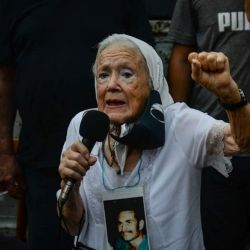
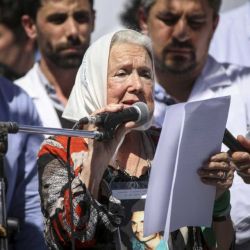
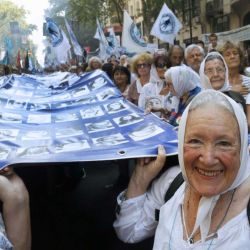
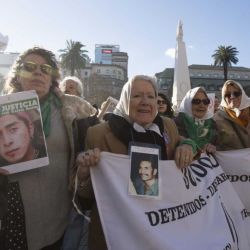
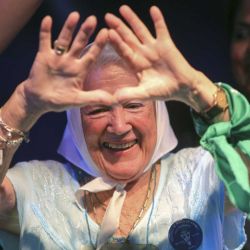
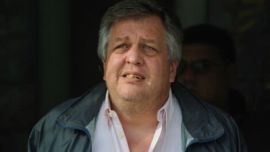













Comments